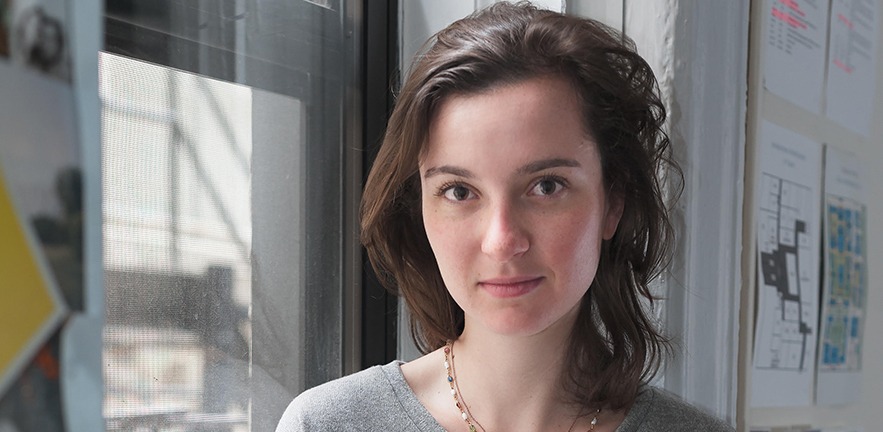Tara Heuzé-Sarmini (MPhil in Finance 2014) talks about her motivation to study finance at graduate level and her non-linear career path encompassing an NGO to fight period poverty and a co-living project for single-parent families.
Tara Heuzé-Sarmini has always pursued projects “that [she’s] passionate about, that fascinate [her] and that have an impact on society as a whole and will hopefully make things slightly better”. This ethos has underpinned her non-linear career path and presented her with opportunities that would have been closed to her had she chosen a traditional, corporate career.
The desire to make a difference was the driving force behind Tara’s decision to study for an MPhil in Finance at Cambridge Judge. She had initially considered a career in diplomacy but changed her mind after two internships at the French embassy in Moscow, where she witnessed first-hand the annexation of Crimea and experienced deep disappointment at the lack of involvement of the Ambassador. She realised then that “it was really finance and banks that have the future of countries in their hands, and that can have a positive or negative impact on this”. If she really wanted to make a difference, she would have to work in finance and “make it work for good and change it from the inside”. However, after her first few work experiences in the field, she realised that innovative and disruptive companies were actually the ones behind systemic change, not banks or investment funds.
Tara absolutely loved studying in Cambridge. She describes the MPhil in Finance as “probably my most challenging academic year. Intellectually, it was extremely stimulating, and I met incredible people with whom I am still friends today. It was an amazing experience.”
Tackling period poverty for gender equality
It was during her time at Cambridge Judge that Tara became aware of a campaign to provide homeless women in the city with sanitary products. She describes period poverty as a hurdle keeping women and girls out of education and work. Remedying this is a major step towards gender equality.
After graduating, Tara returned to France to study and realised that the issue of period poverty was completely unaddressed there, attributing this to the enormous taboo that existed around the subject. She set up a collection campaign as a side-project, which rapidly snowballed and, in 2015, founded Règles Élémentaires, a non-profit organisation that solves period poverty through the collection and distribution of sanitary products. Règles Élémentaires has now grown into a major organisation with an annual budget of almost one million euros and a team of 15 people. Several laws have been passed in France as a direct result of its activism, most notably free access to sanitary products for women in prisons, universities, most high schools, and middle schools.
Règles Élémentaires is also creating a platform for citizen mobilisation, with people across France organising collection campaigns. Tara says, “it’s important to remind people that a few clicks and likes on Instagram and Facebook are not enough to produce actual, significant change.”
Règles Élémentaires isn’t the first organisation in the world to fight period poverty but it’s the first in France, and today it partners with many organisations at European level, and even beyond. Tara says, “what’s super interesting is that our platform is probably the most advanced in terms of its technology with a wide range of tools to speed up all the inventory and validation processes, and we are in discussions with other organisations about sharing our technology with them.”
The world’s first co-living concept for single-parent families
After graduating with a dual degree from SciencesPo and Columbia in 2017, where she focused on energy and the environment, Tara started her career in tech. Soon after, she was headhunted by a co-living company to expand its business in Germany; this prompted her to explore the co-living sector. Although she had no interest in working on co-living for “yuppies”, she soon realised that it is a highly interesting area for isolated people. The idea remained at the back of her mind when she was asked to step in as CEO of Règles Élémentaires from early 2020 until October 2021, a position she always knew would be temporary.
As Tara planned her next career move, she investigated the co-living sector in greater detail and realised there was an elephant in the room: single parents and their children, whose needs had been completely overlooked by public policies and traditional real-estate developments, and who had become the population segment most likely to fall into poverty across most OECD countries. This convinced Tara, together with business partner Ruben Petri, to found Commune in 2021. Commune is the first urban co-living project to offer a turnkey and accessible housing and services solution for single-parent families.
According to the French national institute of statistics (INSEE), one family in 4 is a single parent family in France and, according to Tara’s research, it’s almost one family in 3 in Paris. Tara says, “stats show that, on average, single parents will lose about 28% of quality of life one year after the breakup of their marriage, and quality of life includes income, social activities, wellbeing, etc”. As (re)housing is the primary challenge faced by single parents, Commune strives to offer a 20% to 30% discount compared to traditional private-market housing. Childcare is an enormous challenge faced by single parents, and Commune will provide 3 hours per day of on-site, after-school childcare at an extremely low price. It is envisioned that families will stay with Commune “for one to 3 years, to give parents time to settle down and breathe before they find a longer-term solution… or meet someone with whom they want to live!”
Tara describes real estate as a very traditional, old-fashioned sector with “entrenched privileges; it’s not diverse or representative. The fact that investors all look alike also creates a lack of innovation.” Tara made a conscious effort to ensure that Commune had a very representative investor base. “I’m very proud to say that we have 45% of women investors, 13 nationalities represented, 50% first-time investors, and also 45 years between the oldest and youngest investors.”
Similarly, hiring-wise, Tara says, “we actually decided to extend some of our recruitment processes to have more women come in, and we publicly communicated the fact that we needed more women in the pool, because if women don’t break into traditionally male-dominated industries, which are almost all industries, at least at senior levels, this will never change.”
Multi-disciplinarity is key to achieving balance

Tara firmly believes in pursuing all one’s interests to maximise one’s opportunities. She herself has always had core and satellite projects and done multiple things at once. She encourages other CJBS students to “keep some sort of multi-disciplinarity, be it in your studies, your activities, and always be open to new opportunities”. Tara practices what she preaches: when studying for the MPhil, she also took Italian classes and was involved in various art projects. Furthermore, she is an accomplished sculptor. A student of Murray Edwards College, one of the bronzes in her Yes, we can series features in its New Hall Art Collection, and her works have also been exhibited in Moscow, Paris and Hong Kong. She believes that everything is possible if you put your heart and soul into it. In fact, Tara sold her sculptures to finance her studies at Cambridge Judge. “Take a bird’s eye view on life, because there is more to life than academic grades, and your career can take many different paths. Accept what truly corresponds to you. Very early on, I was at peace knowing that I wouldn’t have a traditional, linear, corporate career. I wasn’t interested in that. Life is short, so take the best and leave the rest.”


